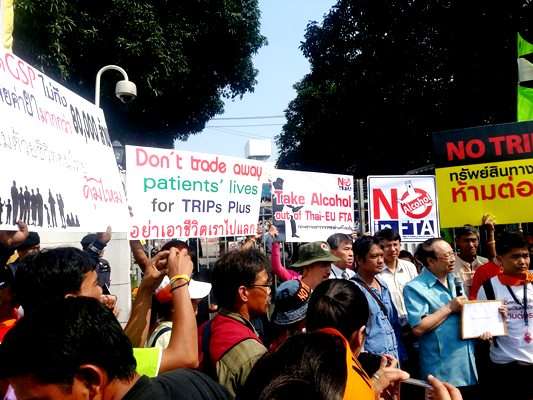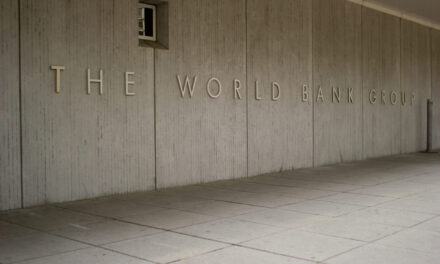“Speedy” and “careless”—this is how Thailand’s civil society organizations describe the negotiating framework the Ministry of Commerce has drafted in time for the official start of the negotiation on the Free Trade Agreement (FTA) with the European Union (EU) on March 6 and 7.
A week before the FTA negotiations began, 1,500 members of social movements and non-government organizations led by FTA Watch had marched on February 28 to the government house to also mark the start of the campaign against the EU-Thai FTA negotiation. The demonstrators had met with the chief negotiator of the EU-Thai FTA, also the chair person of the Thai Trade Representatives. On said day, the government positively responded to the demand to establish a transparent and democratic negotiation process by increasing public participation and involving social movements and CSO representatives in the negotiation advisory committee.
FTA Watch and its allies vowed to closely monitor the process and continue the pressure on the government on key sensitive issues namely intellectual property rights, investor protection and on key sensitive products such as alcohol beverages throughout the negotiation period.
Included in this new FTA negotiations are matters that have never been discussed in other FTAs before, such as intellectual property in medicines and biodiversity, foreign investment’s protection and arbitration for international dispute settlement between state and the private sector, as well as goods harmful to health (e.g. alcohol and cigarette), and the issue of severe impacts in diverse aspects. Thus, the negotiating parties shall be compelled to get the Parliament’s endorsement and to pursue a consultation process according to the Constitution’s Section 190.
However, all the procedures—the public consultation, the preparations for the negotiation preparation, the drafting of the negotiating framework, and the consideration by the Cabinet and the Parliament—have been riddled with flaws. So is the negotiation’s content. Several concerns that shall have long lasting adverse effects on society have been neglected.
The Commerce Ministry has cited that it ran more than 60 nationwide consultation meetings, but the draft of the negotiating framework has never been shared in those public hearings.
Only a general question of—“what do people think about FTAs”—has been asked of people who participated in the hearings. Moreover, concerns and recommendation raised in the consultations have not been taken into account or included in the negotiating framework endorsed to the Parliament. The negotiation has not taken into account considerable factors such as the country’s development level, sustainability, the country’s safeguard mechanism, legal preparedness, adjustment’s lead time, and safety net measures for the unpleasant impact.
A statement issued by the FTA Watch and allies also underscored the following critical points about the negotiation:
1. The negotiation blindly aims to sustain the country’s Generalized System of
Preference (GSP) despite the fact that Thailand’s GSP will be cut off in the near future, because Thailand is no longer eligible for the EU’s GSP. Thailand’s per capita income has moved up to the upper-middle level for three years in a row and its export has taken over the market larger than 17.5 percent. Without the GSP, it does not mean that Thailand will totally lose its revenue from the export to the EU, amounting to 297,000 million Thai Baht. Instead, it’s estimated that only 79,422 million Baht will be dropped due to the GSP removal. And, the ongoing Eurozone crisis is also a key factor to be considered, as its impact will discourage Thailand from earning huge income from the export to the EU.
2. The Thai government ambitiously set the timeframe to have ten rounds of negotiation within 1.5 years to complete the FTA negotiation with the EU. This is to ensure it will be able to renew the EU’s GSP in time in early 2015. Such swift timeframe undermines its power in the negotiation with the EU.
3. The industrial sector’s demands not to raise the bar of labor protection, environmental protection, and measures to address climate change, are well accepted by the government.
FTA Watch and allies also said that the draft framework “neglected the impact on people’s lives and livelihoods.” These projected impacts are:
1. If Thailand accepts the stricter intellectual property (IP) conditions on medicines, the lifesaving medicines’ market will be taken over in the long term. The medicines will be tremendously expensive due to lack of competition. A great number of patients will not be able to access necessary medicines. Health budget’s burden will increase significantly and the country’s health insurance program will be at risk of collapsing, because of the high medicine cost.
2. If we allow strict IP protection on biodiversity, it paves the way for favoring the multinational corporations to take over the seed supply. It’ll result in high production costs in the agriculture sector and definitely an increase in food prices.
3. If the foreign investment in natural resources and agriculture will be over protected, small-scale farmers will be vulnerable in losing their control of production assets and become farming labors in their own lands. Food’s supply chain and food prices will be under control of the multinational food industry.
4. While the lifesaving medicines are so expensive, goods harmful to health (e.g.
alcohol and tobacco) will be greatly benefited by the tariff reduction. They will be sold at cheap prices and encourage the larger number of new-face drinkers or smokers, who are at risk of chronic morbidity. The FTA will also restrict the state’s policy enforcement and its legislation to control alcohol and tobacco consumption.
5. FTAs with the condition of the international dispute settlement mechanisms will be a barrier to government’s legislation and/or enforcement laws and policies that will safeguard its citizens in the matters of public health, consumer protection, environment, farming and small medium enterprise. If the government imposes a policy undermining the foreign investors’ earning, investors can sue the government for compensations and/or the policy revocation in the international arbitration, rather than a court in the country.
6. FTAs with restrictions on IP more stringent than the World Trade Organization’s standard will as well hinder access to knowledge through books and the online cyber world.
To ensure that the whole nation will truly achieve the benefits out of the FTA between Thailand and the EU by recognizing the balance of the benefits and the adverse impact on people who are directly affected by the FTA and also people in general, FTA Watch has urged Prime Minister Yingluck Shinawatra and Mr. Olarn Chaipravat, the Thailand-EU FTA negotiation team’s leader, to give the social commitment before the public that the Thailand-EU FTA negotiation delegation will do the following:
1. Thailand shall not accept the content of the Thailand-EU FTA negotiation on intellectual property that is stricter than the World Trade Organization’s TRIPS 3Agreement, which is known as TRIPS-plus provisions including patent term extension, data exclusivity, and border measures. And, the existing biodiversity protection law that is already complied with in TRIPS Agreement and Convention on Biological Diversity must be unchanged.
2. The international dispute settlement mechanism in the investment chapter must not be applied to the disputes over social investment, policy enforcement and legislation to safeguard the public’s interests, environment protection, and policies on public health, infrastructure, and security by, using the international arbitration.
3. Investments affecting natural resources, farming, aquaculture, plant propagation and food security shall not be free of obligations.
4. Alcohol and tobacco must be removed out of the negotiation.
5. Consultation with all the stakeholder sectors shall be carried out prior to and after every round of the negotiation. In the consultation meeting, the negotiation team must also declare the positions and the progress of the negotiation, and take into account recommendations by the stakeholders and comply with the recommendations by balancing different interests of all the stakeholders.
The network that kicked off the campaign includes the following organizations: FTA Watch; The Thai Network of People living with HIV/AIDS (TNP+); Thai NGO Coalition on AIDS; Foundation for AIDS Rights; AIDS ACCESS Foundation Renal Failure Patient Group; Cancer Patient Group; Drug Study Group; Foundation for Consumers; Rural Pharmacists Foundation; Thai Holistic Health Foundation; BioThai Foundation; Alternative Agriculture Network (AAN); Ecological Alert and Recovery – Thailand (EARTH); Assembly of the Poor; 4 regions of Slum Network; Stopdrink Network; Alcohol’s Danger Protection Campaign Network; The Network of Community Affected by Alcohol; The Network of the Alcohol’s Danger Surveillance in Bangkok; The Youth Network of the New Drinkers’ Protection; Health & Development Foundation; and Focus on the Global South.#








